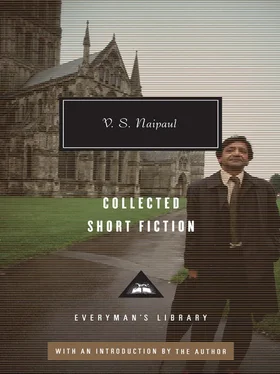He took the little red stump of a pencil he had stuck over his ear and puzzled over the words. At first he wanted to announce himself as an architect; but I managed to dissuade him. He wasn’t sure about the spelling. The finished sign said:
BUILDER AND CONTRACTOR
Carpenter
And Cabinet-Maker
And I signed my name, as sign-writer, in the bottom right-hand corner.
Popo liked standing up in front of the sign. But he had a little panic when people who didn’t know about him came to inquire.
‘The carpenter fellow?’ Popo would say. ‘He don’t live here again.’
I thought Popo was a much nicer man than Bogart. Bogart said little to me, but Popo was always ready to talk. He talked about serious things, like life and death and work, and I felt he really liked talking to me.
Yet Popo was not a popular man in the street. They didn’t think he was mad or stupid. Hat used to say, ‘Popo too conceited, you hear.’
It was an unreasonable thing to say. Popo had the habit of taking a glass of rum to the pavement every morning. He never sipped the rum. But whenever he saw someone he knew he dipped his middle finger in the rum, licked it, and then waved to the man.
‘We could buy rum too,’ Hat used to say. ‘But we don’t show off like Popo.’
I myself never thought about it in that way, and one day I asked Popo about it.
Popo said, ‘Boy, in the morning, when the sun shining and it still cool, and you just get up, it make you feel good to know that you could go out and stand up in the sun and have some rum.’
Popo never made any money. His wife used to go out and work, and this was easy, because they had no children. Popo said, ‘Women and them like work. Man not make for work.’
Hat said, ‘Popo is a man-woman. Not a proper man.’
Popo’s wife had a job as a cook in a big house near my school. She used to wait for me in the afternoons and take me into the big kitchen and give me a lot of nice things to eat. The only thing I didn’t like was the way she sat and watched me while I ate. It was as though I was eating for her. She asked me to call her Auntie.
She introduced me to the gardener of the big house. He was a good-looking brown man, and he loved his flowers. I liked the gardens he looked after. The flower-beds were always black and wet; and the grass green and damp and always cut. Sometimes he let me water the flower-beds. And he used to gather the cut grass into little bags which he gave me to take home to my mother. Grass was good for the hens.
One day I missed Popo’s wife. She wasn’t waiting for me.
Next morning I didn’t see Popo dipping his finger in the glass of rum on the pavement.
And that evening I didn’t see Popo’s wife.
I found Popo sad in his workshop. He was sitting on a plank and twisting a bit of shaving around his fingers.
Popo said, ‘Your auntie gone, boy.’
‘Where, Mr Popo?’
‘Ha, boy! That’s the question,’ and he pulled himself up there.
Popo found himself then a popular man. The news got around very quickly. And when Eddoes said one day, ‘I wonder what happen to Popo. Like he got no more rum,’ Hat jumped up and almost cuffed him. And then all the men began to gather in Popo’s workshop, and they would talk about cricket and football and pictures — everything except women — just to try to cheer Popo up.
Popo’s workshop no longer sounded with hammering and sawing. The sawdust no longer smelled fresh, and became black, almost like dirt. Popo began drinking a lot, and I didn’t like him when he was drunk. He smelled of rum, and he used to cry and then grow angry and want to beat up everybody. That made him an accepted member of the gang.
Hat said, ‘We was wrong about Popo. He is a man, like any of we.’
Popo liked the new companionship. He was at heart a loquacious man, and always wanted to be friendly with the men of the street and he was always surprised that he was not liked. So it looked as though he had got what he wanted. But Popo was not really happy. The friendship had come a little too late, and he found he didn’t like it as much as he’d expected. Hat tried to get Popo interested in other women, but Popo wasn’t interested.
Popo didn’t think I was too young to be told anything.
‘Boy, when you grow old as me,’ he said once, ‘you find that you don’t care for the things you thought you woulda like if you coulda afford them.’
That was his way of talking, in riddles.
Then one day Popo left us.
Hat said, ‘He don’t have to tell me where he gone. He gone looking for he wife.’
Edward said, ‘Think she going come back with he?’
Hat said, ‘Let we wait and see.’
We didn’t have to wait long. It came out in the papers. Hat said it was just what he expected. Popo had beaten up a man in Arima, the man had taken his wife away. It was the gardener who used to give me bags of grass.
Nothing much happened to Popo. He had to pay a fine, but they let him off otherwise. The magistrate said that Popo had better not molest his wife again.
They made a calypso about Popo that was the rage that year. It was the road-march for the Carnival, and the Andrews Sisters sang it for an American recording company:
A certain carpenter feller went to Arima
Looking for a mopsy called Emelda .
It was a great thing for the street.
At school, I used to say, ‘The carpenter feller was a good, good friend of mine.’
And, at cricket matches, and at the races, Hat used to say, ‘Know him? God, I used to drink with that man night and day. Boy, he could carry his liquor.’
Popo wasn’t the same man when he came back to us. He growled at me when I tried to talk to him, and he drove out Hat and the others when they brought a bottle of rum to the workshop.
Hat said, ‘Woman send that man mad, you hear.’
But the old noises began to be heard once more from Popo’s workshop. He was working hard, and I wondered whether he was still making the thing without a name. But I was too afraid to ask.
He ran an electric light to the workshop and began working in the night-time. Vans stopped outside his house and were always depositing and taking away things. Then Popo began painting his house. He used a bright green, and he painted the roof a bright red. Hat said, ‘The man really mad.’
And added, ‘Like he getting married again.’
Hat wasn’t too far wrong. One day, about two weeks later, Popo returned, and he brought a woman with him. It was his wife. My auntie.
‘You see the sort of thing woman is,’ Hat commented. ‘You see the sort of thing they like. Not the man. But the new house paint up, and all the new furniture inside it. I bet you if the man in Arima had a new house and new furnitures, she wouldnta come back with Popo.’
But I didn’t mind. I was glad. It was good to see Popo standing outside with his glass of rum in the mornings and dipping his finger into the rum and waving at his friends; and it was good to ask him again, ‘What you making, Mr Popo?’ and to get the old answer, ‘Ha, boy! That’s the question. I making the thing without a name.’
Popo returned very quickly to his old way of living, and he was still devoting his time to making the thing without a name. He had stopped working, and his wife got her job with the same people near my school.
People in the street were almost angry with Popo when his wife came back. They felt that all their sympathy had been mocked and wasted. And again Hat was saying, ‘That blasted Popo too conceited, you hear.’
But this time Popo didn’t mind.
He used to tell me, ‘Boy, go home and pray tonight that you get happy like me.’
What happened afterwards happened so suddenly that we didn’t even know it had happened. Even Hat didn’t know about it until he read it in the papers. Hat always read the papers. He read them from about ten in the morning until about six in the evening.
Читать дальше









